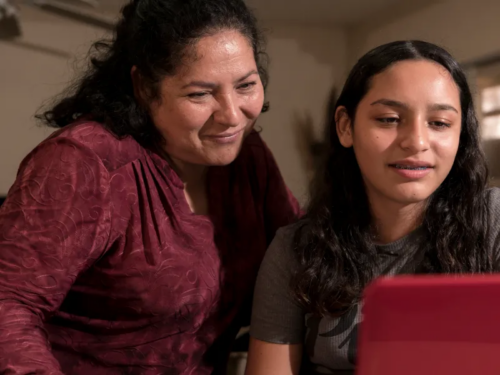
Table of Contents
How Family Therapy Can Help Your Teen
Written By: Charlie Health Editorial Team
Updated: July 12, 2023
9 min.
One of the best ways to help teens cope with mental health issues is through family therapy. We outline what family therapy is and how it can start your family on the healing journey.
Learn more about our Clinical Review Process
Table of Contents
What is family therapy?
Family therapy, also known as family counseling, is a form of psychotherapy aimed at addressing family conflicts by improving communication skills between family members. Family therapy views individuals’ problems in the context of a larger unit: the family system. According to family systems theory, individual problems cannot be successfully addressed or resolved without understanding the dynamics of the whole family.
Family counseling can be a valuable resource for families, but the term “family” does not necessarily mean blood relationships. In the context of family counseling, “family” means anyone who plays a long-term supportive role in one’s life—whether they’re a family member in the same household, extended family, or another important source of support.
How does family therapy work?
During family therapy sessions, you’ll work with a therapist to examine how one family member’s behaviors affect them and their relationships with other family members. To help families work together toward a healthier home life, family therapists help family members develop new ways to communicate, improve family interactions, and navigate challenging situations as a team.
In general, most family sessions last around 60 minutes, and family therapy usually involves once-a-week sessions. Family therapy is typically a short-term treatment lasting around 12 sessions. However, the frequency and duration of your sessions, as well as the number of sessions you’ll need, will depend on your family’s unique needs. Family therapy is also an integral part of our virtual intensive outpatient program (IOP) at Charlie Health.
What are the benefits of family therapy?
Family therapy helps families strengthen their relationships, communicate more effectively, and navigate stressful situations for a more peaceful and connected home life. It can help family members navigate life transitions, problematic patterns of interaction, psychological problems, and other sources of family conflict.
As a more holistic approach to psychotherapy, research shows that family therapy is extremely effective in many situations that cause family conflict, such as substance abuse and eating disorders. In family therapy, families work through problems with the guidance of an experienced mental health professional in a safe, confidential, and controlled space.
By practicing the skills learned in family therapy outside of therapy sessions, families can:
- Learn how to set healthy, appropriate boundaries and respect family members’ boundaries.
- Improve their communication skills and problem-solving strategies.
- Cultivate connectedness, empathy, and understanding.
- Reduce family conflict and improve anger management skills.
- Support members to overcome challenges and work toward their own goals.
In particular, family counseling can improve family relationships by:
- Helping families navigate stressful situations, such as divorce or financial issues.
- Building trust between family members.
- Encouraging families to express their feelings and listen to each other.
- Fostering a healthy, supportive family environment.
- Establishing strategies to cope with stress and tension.
- Promoting forgiveness and empathy among family members.
Throughout the therapeutic process, a family therapist will help family members develop the tools they need to facilitate healing. By working on these skills during family sessions and practicing them in real life, families can boost their potential for success and healthy functioning.
When should you seek a family therapist?

Above all else, family therapy aims to bring families together by fostering healthy communication and emotional processing. Even if you’re not living with a mental health condition or dealing with related symptoms, family therapy can create a successful foundation by helping families understand each other and communicate more effectively. Some common reasons families seek therapy include:
Mental health conditions
When a family member is living with PTSD, bipolar disorder, or another mental health condition, family therapy can help other members understand the condition, explore treatment options, and provide emotional support.
Emotional and behavioral problems
If left unchecked, emotional and behavioral problems in children and adolescents can lead to poor school performance, mental health challenges, and family problems. These problems do not exist in a vacuum, and family counseling can help families address these patterns within the context of the family.
Cross-generational boundaries
Sometimes, family conflicts can arise from cross-generational boundaries, such as when parents share a home with grandparents or when children are raised by grandparents. In this case, family counseling helps improve communication and gives family members skills to set appropriate boundaries.
Different backgrounds
Family therapy can help families who come from different racial, cultural, or religious backgrounds by promoting connectedness and understanding across differently held traditions, beliefs, and values.
Emotional support
Family therapy can provide emotional support by creating a safe and supportive environment where family members can express their feelings, concerns, and experiences. Through this process, family therapy helps individuals feel heard, supported, and validated, which contributes to their emotional well-being and fosters a sense of belonging and connection within the family unit.
Major life changes
Family counseling can help families struggling with stressful situations, such as the death of a family member, financial issues, or marital problems. During family sessions, families can share their thoughts and feelings in a safe space, recognize their strengths, and emerge as a stronger, more cohesive family unit.
How to find a family therapist
Whether you’re preparing for your first session or returning to therapy after some time away, it’s worth taking the time to find a good fit. According to the American Psychological Association, your therapeutic relationship—the relationship between you and your therapist—can have long-lasting impacts on your mental health, even after therapy ends. This is just as true in individual therapy as it is in family therapy. When you find a family therapist that the entire family feels comfortable with and trusts, you’ll take the first step toward honest conversations and real healing.
So, how can you find the right match for your family? Finding a good fit can feel overwhelming, especially if you’re already dealing with a stressful home life—but it doesn’t have to be. You can start your search by checking provider directories, asking for referrals from a family doctor, or researching online therapy programs. Once you’ve found a few potential matches, it’s time to research their credentials and schedule an initial consultation.
While social workers, psychologists, counselors, and other mental health professionals can seek specialized training in family therapy, not all providers have family systems therapy experience, so make sure to check out the specifics of their training credentials. It’s also important to remember that different therapists will utilize different treatment methods and preferred techniques.
If you’re seeking treatment for specific challenges, take the time to research your options. For example, if your teenager is struggling with substance use issues, search for a mental health expert with years of experience treating substance abuse. On the other hand, if a family member is questioning their sexual orientation, search for a therapist with specialized training in LGBTQIA+ issues. Ultimately, finding a good fit can make all the difference in your therapy experience and the way family members interact with each other.
Can family therapy help if your adolescent has mental health concerns?
Family therapy and adolescent counseling often go hand-in-hand. While individual therapy helps teens address their specific issues, family therapy helps parents and teens communicate and support each other. That’s why a combination of individual therapy, family therapy, and supported groups is the core component of Charlie Health’s IOP.
As an example: as one of the most common mental health conditions, clinical depression isn’t always expressed by tears or sadness—although it can be. Sometimes, teen depression looks like angry outbursts or irritability. Your teenager might complain about physical pain, such as headaches or stomach aches. They might withdraw from social relationships, experience intense mood swings, or lack motivation. If left unchecked, teenage depression can take a significant toll on your teen’s mental well-being, and feelings of hopelessness and despair can extend into adulthood.
Fortunately, family therapy can help families explore their treatment options and understand the impact of mental health conditions at the family level. Teen depression and anxiety are challenging for teens to understand—and early treatment can help teenagers transition into early adulthood feeling supported, loved, and understood.
Family therapy also helps parents learn how to offer teens unconditional support. Therapy sessions can open the door for honest conversations with your teen, helping you identify unhealthy behaviors and red flags to watch out for. It can also help parents understand the signs of depression and other mental health symptoms, support their teen during treatment, and create a healthy family environment to promote healing.
Do you need more support with
your mental health?
Charlie Health can help.
What therapy techniques are used in family therapy?
Depending on your unique family situation, your family therapist might utilize techniques from therapies including cognitive behavioral therapy (CBT), dialectical behavioral therapy skills (DBT), or interpersonal therapy. Some common techniques used during family therapy include:
The miracle question
The “miracle question” exercise can be used in individual therapy, couples counseling, or family therapy to help clients set goals for treatment. In the context of family therapy, the miracle question helps members of the family understand what other family members need to be happy with their relationship. Your family therapist might ask, “Suppose that, tonight, a miracle occurs while you’re asleep. When you wake up tomorrow, what are some things that would make your life better?” These answers help guide both the client and the therapist by encouraging clients to set goals for the future and allowing the therapist to utilize the most appropriate treatment to work toward those goals.
Emotions ball
This is a simple family therapy technique used to take pressure off of talking about emotions. A beach ball is ideal for this activity, as it’s big enough to write several emotions on and easy to throw around the room. Write several emotions on the ball, such as “sadness,” “happiness,” and “loneliness,” and throw the ball back and forth between family members. When someone catches the ball, they have to describe a time when they felt the emotion facing them.
Mirroring
Mirroring can be a useful exercise for children and adolescents, but it can help families of any age group. It involves standing in front of a family member and copying their actions. Your therapist might model this exercise with a family member, and then that person might take turns leading others. Mirroring requires each family member to give each other their full attention, cooperate, and communicate with words and body language. In this way, mirroring helps families become more in tune with each other.
These techniques are meant to be used within a professional treatment setting, but they can also help families wishing to explore the possibilities of family therapy before starting long-term treatment.
Why is family therapy important?
Sometimes, even the most communicative and connected families feel overwhelmed and stretched beyond their ability to cope. It’s completely normal to experience conflicts, stress, or troubles as a family, but the key to maintaining healthy family relationships is to understand and communicate with each other. So when financial issues, marital problems, or conflicts between family members arise, family therapy can help families regain their strength and move forward.
No matter what your family relationships look like, family therapy can be a valuable resource for the whole family. It can help families support each other, communicate effectively, and work together to solve family problems. Family therapy can be used as a standalone treatment, or it can be combined with individual psychotherapy to treat specific issues affecting members of the family.
Whether you’re seeking support for teenage depression or looking to strengthen your family relationships, here’s everything you need to know about family therapy before getting started.
Family therapy at Charlie Health
Starting family therapy can feel like a big step, but it can be a necessary step to overcome family conflict and move forward. Remember: Seeking professional help isn’t a sign of weakness—it’s an important resource to build your family’s resilience.
At Charlie Health, we deliver high-quality, comprehensive mental health treatment for adolescents, young adults, and their families to support connectedness and mental wellness. Our IOP helps adolescents address specific challenges with individual psychotherapy, supported groups, and family therapy.
No matter where you are in your mental health journey, we’re here to support you with a customized treatment plan based on your unique needs. Our team of compassionate, experienced mental health professionals will help you explore your treatment options and jumpstart your journey toward mental wellness. Get started today.





